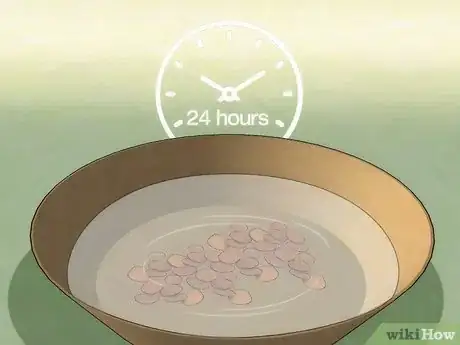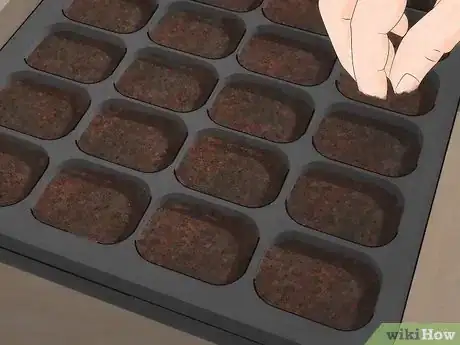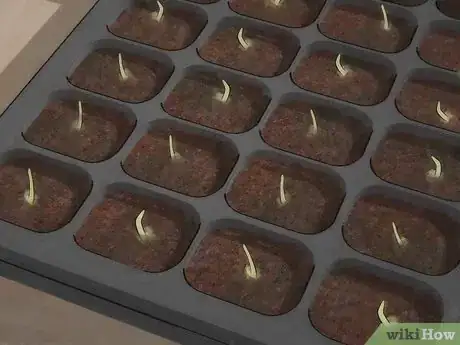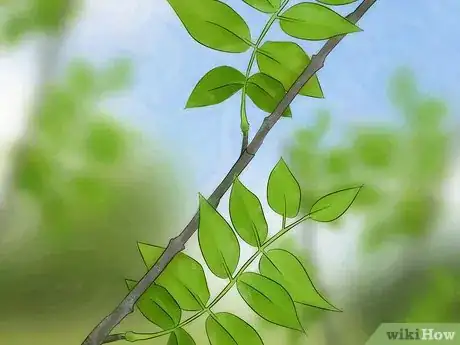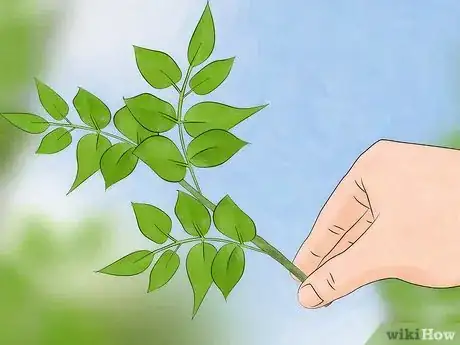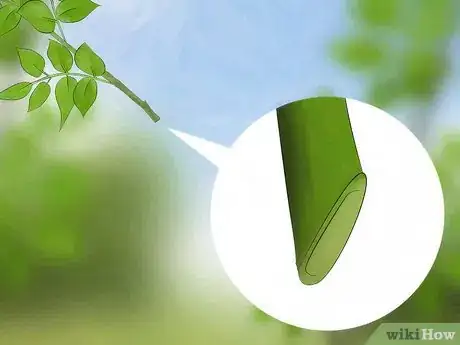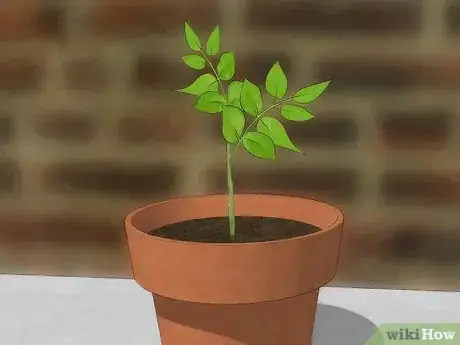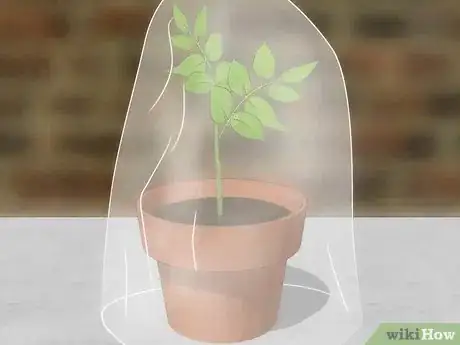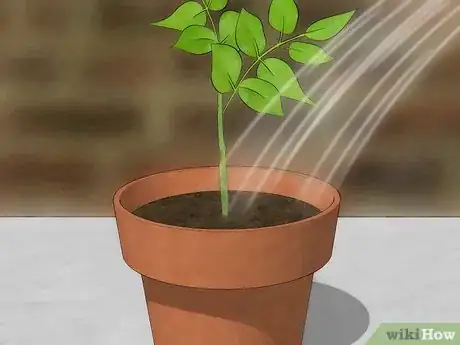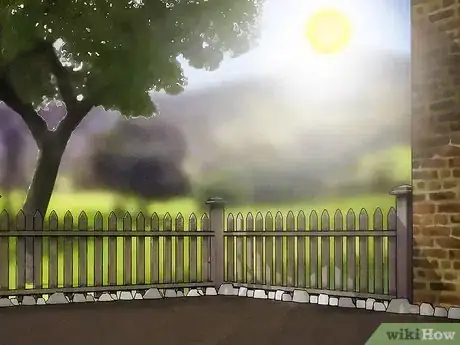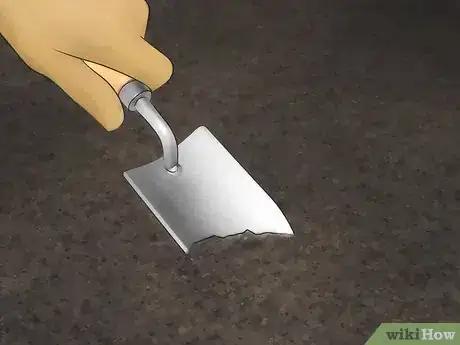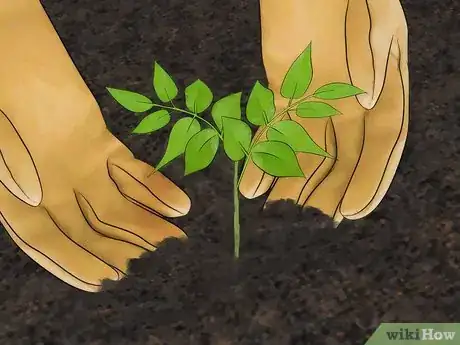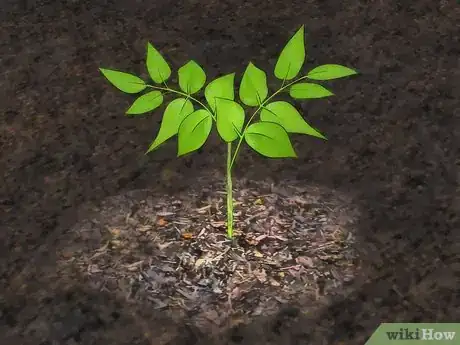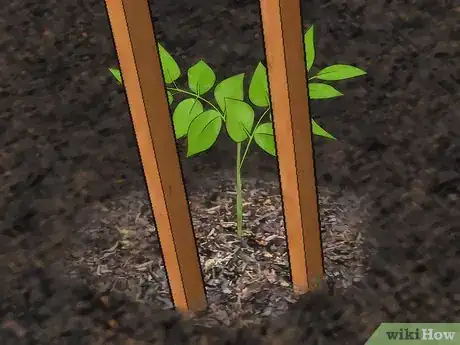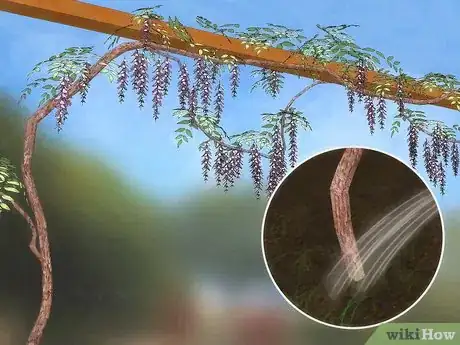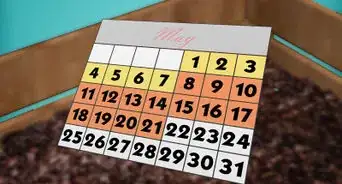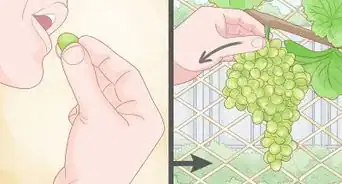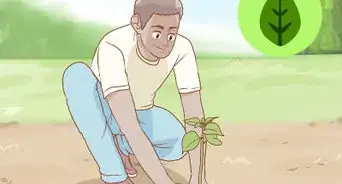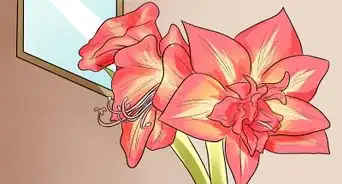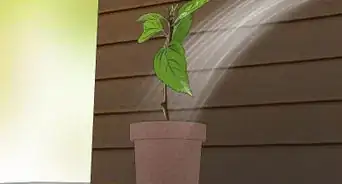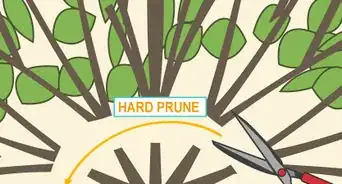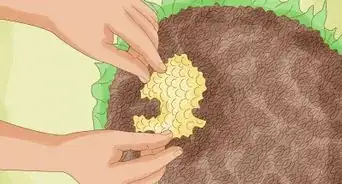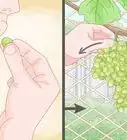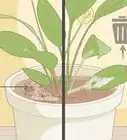This article was co-authored by Katie Gohmann. Katherine Gohmann is a Professional Gardener in Texas. She has been a home gardener and professional gardener since 2008.
There are 9 references cited in this article, which can be found at the bottom of the page.
wikiHow marks an article as reader-approved once it receives enough positive feedback. In this case, 88% of readers who voted found the article helpful, earning it our reader-approved status.
This article has been viewed 96,764 times.
Wisteria is a hearty woody vine that’s native to parts of North America and Asia. It’s recognized for its beautiful and scented hanging flower clusters, but the plant itself can grow very large and will even survive winter, frost, and snow. Wisteria needs lots of sun, water, and physical support to thrive, but as long as it has these things, it will grow well in many locations throughout the world. You can grow wisteria from seeds or from cuttings, but it’s possible that plants grown from seeds will take longer to bloom.
Steps
Growing Wisteria From Seeds
-
1Germinate the seeds. When you're growing a plant from a seed, it can help to germinate the seed first, because this will increase the chances of it taking root in the ground.
- Place the seeds in a small bowl and fill it with warm water. Let the seeds sit in the water for 24 hours.[1]
- After 24 hours, drain the water. On each seed, use your nail to gently pick away a small portion of the seed covering.
- Note that wisteria should be planted outdoors in the spring or fall, so make sure you start the germination process about six weeks before you want to transplant it outside.[2]
-
2Plant the seeds in a seed starter. Fill a seed starter most of the way with potting soil and place one or two wisteria seeds on top of the soil in each pod. Make sure the seeds are on their sides. Cover them with one-quarter inch of potting soil.[3]
- Place the seed trays in a warm, bright room. Add some water to the soil, and keep it moist for the duration of the sprouting time.
Advertisement -
3Allow the seeds to sprout. Keep the seeds warm and moist while they germinate, and give them lots of natural light. The seeds should sprout within 10 to 30 days.
- Before you can transplant the sprouts, make sure they are at least four to five inches tall, and have a couple leaves on each stalk.[4]
Starting a Plant from Cuttings
-
1Find a plant to take a cutting from. A cutting is a root, leaf, shoot, or bud that gets trimmed off an established plant to propagate a new plant of the same kind. To do this, you will need an established wisteria plant to take the cutting from.[5]
- If you don’t have an established plant to work with, ask friends or neighbors if they have a wisteria you can use.
-
2Take a cutting. For wisteria, you want to cut off a new shoot that still has soft green wood and that hasn’t yet developed bark. Make sure the shoot has a few sets of leaves on it (a couple on the top and a couple on the bottom).[6]
- With a pair of sharp scissors or gardening snips, cut the shoot near the base. Make sure the cutting you take is about six inches long.
- You will have the highest chances of success if you do this at the end of spring or beginning of summer.
-
3Prepare the cutting. Snip off any leaves that are at the bottom of the cutting, leaving ones at the top intact. Then, snip off the bottom of the cutting at a 45-degree angle so there's only one-half inch (127 mm) of stem below the bottom leaf node that you cut. This will give the new roots somewhere to grow from and allow them to establish.[7]
- For the best results, dip the end of the cutting into a rooting hormone before planting it.[8]
-
4Plant the cutting. Place some rocks in the bottom of a small gardening pot to help with drainage. Fill the pot with potting soil that’s specifically designed for good drainage—look for a soil with a high perlite or coarse sand concentration. Add some water so the soil is moist. Make a two-inch (5 cm) deep hole in the soil with your finger and place the cutting in so the leaves are sticking up.[9]
- Replace the soil and cover the bottom of the cutting where the roots will grow.
-
5Cover the pot with plastic. This will keep the soil moist and warm, and this will help the wisteria to take root. You can either wrap the entire pot in a plastic bag, or cover the top with a plastic bag or plastic wrap.[10]
- Place the pot in an area where the plant will receive lots of indirect sunlight.
-
6Water regularly. When the soil becomes dry to the touch, add water so it’s always moist. After about four to eight weeks, the cutting should take root.[11]
- Since it’s best to plant wisteria in spring or fall, don’t plant the wisteria as soon as it begins to take root. Wait until fall to transplant it outside, or continue growing the new plant inside in pots until the following spring.
Transplanting Cuttings and Sprouts
-
1Choose the right location. There are a few considerations when planting wisteria, including what the plant needs to survive and where it won’t cause damage. For instance:
- The plant can grow quite large, so while it will grow nicely as a vine up a gazebo or pergola, this may not be a wise choice unless you're comfortable getting on a stepladder to prune the tree.
- Similarly, because wisteria is a climbing vine, avoid planting it near your house or any buildings, as eventually the plant can grow underneath siding, or ruin shutters and frames.[12]
- Because wisteria grows so quickly and so heartily, plant it away from other plants, otherwise the wisteria might choke them out.[13]
- Wisteria needs lots of sunlight to grow and bloom, so choose an area where the plant will get full sun exposure. The soil type doesn’t matter so much, but wisteria does need good drainage.[14]
-
2Dig a hole. The hole should be the depth of the roots and two to three times wider than the width of the roots.
- If you're planting more than one wisteria, make sure the holes are at least 10 to 15 feet (3 to 5 m) apart.[15]
-
3Transfer the seedling. When the hole is ready, carefully remove the seedling from the starter pod by tipping it upside down with one hand and cupping the plant with the other.
- When the roots slide out of the pod, gently place the plant roots down into the hole.
- Add enough soil and compost to cover the roots, then water the plant. Allow the water to drain, then fill up the hole with soil and compost.[16]
- Use your hands to press down the soil around the plant, and give it some more water.[17]
-
4Cover it with mulch. Mulch will help keep the soil around the plant moist, which is good for wisteria.
- Each spring, add a layer of compost and a layer of mulch on top of the soil where the wisteria is.[18]
-
5Provide support. Wisteria is a heavy plant, and without the proper support, it will collapse under its own weight in the wind. You will need to provide support in the form of stakes if you didn’t plant your wisteria near to a wall or structure that will support it.
- When the wisteria plant has established itself, insert a wooden stake six to 12 inches into the ground about one-half inch away from the stalk.
- Using twine, attach the wisteria stalk to the stake every eight inches.[19]
-
6Make sure the plant gets enough water. This is especially important in the first year. Wisteria needs the equivalent of one inch of water each week, so if you aren't getting enough precipitation, you will need to water as well.
- Even if you are getting enough rain, you should still give the wisteria a soaking once a week.[20]
-
7Prune regularly. Wisteria responds vigorously to pruning. Pruning is also the key to getting good blossoms from your plant. You’ll want to cut the plant back by at least half of its growth from the past year in late winter, leaving only a few buds per stem. You can prune more during the year, too.[21]
- If you want a more formal appearance, try pruning again the summer after the traditional flowering.
- You can also encourage more blossoms by cutting back shoots every two weeks or so during summer.
Expert Q&A
-
QuestionDo wisteria roots grow laterally? I want to plant it near a deck but we have a pool. I wonder if it is a bad idea?
 Katie GohmannKatherine Gohmann is a Professional Gardener in Texas. She has been a home gardener and professional gardener since 2008.
Katie GohmannKatherine Gohmann is a Professional Gardener in Texas. She has been a home gardener and professional gardener since 2008.
Professional Gardener The roots do grow outward, so don't plant too close to the deck or pool. Other parts of your yard should be okay.
The roots do grow outward, so don't plant too close to the deck or pool. Other parts of your yard should be okay. -
QuestionWill Wisteria Sinensis tolerate wind?
 Katie GohmannKatherine Gohmann is a Professional Gardener in Texas. She has been a home gardener and professional gardener since 2008.
Katie GohmannKatherine Gohmann is a Professional Gardener in Texas. She has been a home gardener and professional gardener since 2008.
Professional Gardener Wisteria is pretty hardy, so it should be fine. You may need to protect it from very strong winds when you first put it in, though!
Wisteria is pretty hardy, so it should be fine. You may need to protect it from very strong winds when you first put it in, though! -
QuestionCan my Wisteria be trimmed to be a tree instead of a vine?
 Community AnswerYes, you can do that.
Community AnswerYes, you can do that.
Warnings
- The Asian varieties of wisteria are very invasive. It’s best to grow American wisteria (Wisteria frutescens) in your yard and garden.⧼thumbs_response⧽
References
- ↑ https://www.youtube.com/watch?v=A-6WrRkKwp4
- ↑ http://www.almanac.com/plant/wisteria
- ↑ http://www.gardenguides.com/80391-plant-wisteria-seeds.html
- ↑ http://www.gardenguides.com/80391-plant-wisteria-seeds.html
- ↑ http://www.britannica.com/topic/cutting-plant-propagation
- ↑ http://www.gardeningknowhow.com/ornamental/vines/wisteria/propagating-wisteria-cuttings.htm
- ↑ https://dengarden.com/gardening/How-To-Grow-Wisteria
- ↑ http://www.gardeningknowhow.com/ornamental/vines/wisteria/propagating-wisteria-cuttings.htm
- ↑ https://www.youtube.com/watch?v=kctzz76K_tM
- ↑ http://www.gardeningknowhow.com/ornamental/vines/wisteria/propagating-wisteria-cuttings.htm
- ↑ https://dengarden.com/gardening/How-To-Grow-Wisteria
- ↑ https://dengarden.com/gardening/How-To-Grow-Wisteria
- ↑ http://www.almanac.com/plant/wisteria
- ↑ https://www.whiteflowerfarm.com/how-to-grow-wisteria-standards
- ↑ http://garden.org/plantguide/?q=show&id=2105
- ↑ http://garden.org/plantguide/?q=show&id=2105
- ↑ https://www.whiteflowerfarm.com/how-to-grow-wisteria-standards
- ↑ http://garden.org/plantguide/?q=show&id=2105
- ↑ https://www.whiteflowerfarm.com/how-to-grow-wisteria-standards
- ↑ https://www.whiteflowerfarm.com/how-to-grow-wisteria-standards
- ↑ http://www.almanac.com/plant/wisteria
About This Article
To grow wisteria, start by planting seeds in a seed starter filled most of the way with potting soil. Next, cover them with 1/4 inch of soil, keep the soil moist, and transplant the spouts outside when they are 4 to 5 inches tall. To grow wisteria from a cutting, find a new shoot and snip off the bottom. After that, fill a pot with rocks and potting soil and place the cutting 2 inches deep. Then, cover the pot in plastic, place it in indirect sunlight, and it should take root in 4 to 8 weeks. For more tips from our Gardener reviewer, like how to germinate the seeds, read on!
